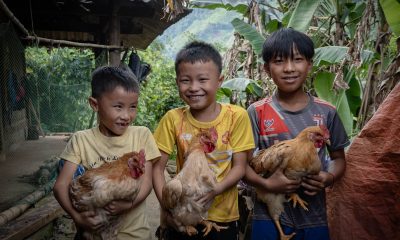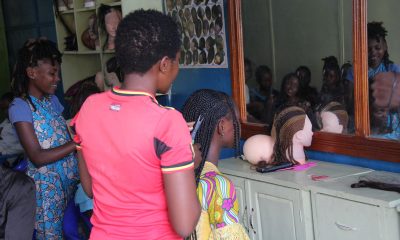A goat farming project in remote Nepal helps physically disabled people learn livelihood skills.
All Devlal thought about was his son.
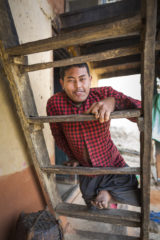
Buddhilal
As houses around him collapsed and the earth beneath him violently rocked and trembled, Devlal only wanted to be sure his son had made it out of the house alive. He worried because his 16-year-old son, Buddhilal, walks on his knees due to a birth defect that also left his hands deformed.
Devlal arrived home to find Buddhilal safe, although the house had succumbed to the quake and sustained numerous cracks.
Many homes in Devlal and Buddhilal’s village were completely destroyed two years ago when a 7.8-magnitude earthquake rocked the central region of Nepal. Some of their neighbors are still living in temporary shelters and trying to rebuild.
Moving forward after the devastating earthquake has proved especially grueling in this village. It’s home to a number of physically disabled Nepalis who were already pushing through more adversity and pain than some endure in a lifetime.
Samaritan’s Purse is working with a local partner on a goat farming project that will enable people like Buddhilal to have a sustainable source of income.
The project has life-changing implications for a population that’s been beaten down, shamed, and tossed aside.
The Cast-offs
Buddhilal is a sweet teenager doing the best he can to enjoy life. His smile is tender and his complaints few.
But in Nepal, if you’re disabled, none of that matters.
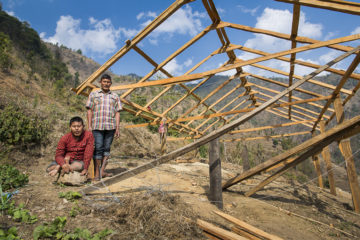
Father and son preparing the goat pen.
“You are an outcast. Many children are kept in cages and tied up,” said Melody Moshkowski, Samaritan’s Purse Nepal Country Director. “Typically, they are thrown out of their communities.”
A child’s family, by association, is usually treated with the same disdain. Individuals with disabilities are not viewed as contributing members of society, nor are they given the opportunity to become such.
The livelihood project teaches beneficiaries how to raise goats and maintain a goat farming business that will yield a profit. Then, as the community realizes these beneficiaries are able to work and contribute, attitudes begin to shift.
“They become somebody that has value,” Melody said. “We’re seeing significant changes in the community.”
A Father’s Love
Devlal, unlike most Nepali parents in similar situations, has never questioned his son’s value and has spent his life watching over Buddhilal.
“Many people say he had a curse from a previous life. It really saddened me,” Devlal explained. “But he’s my son. I keep on loving him and caring for him.”
Devlal is a hard-working husband and father of three. Like most in the village, he is a farmer and grows corn, wheat, and rice. Despite his best efforts, the family is poor.
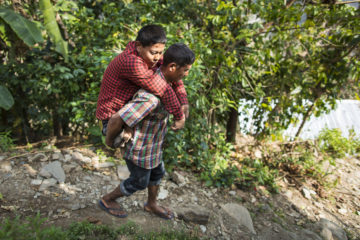
Devlal and Buddhilal trek mountain terrain.
In order for his son to attend school, Devlal must sacrifice time away from his farming in order to carry him to school. Buddhilal sits on his father’s back, arms around his neck, and together they journey down the steep mountain.
The trip is one hour each way. The process is repeated in the afternoon when school lets out.
Their village is so remote that venturing outside it can be nearly impossible for a poor farmer. The first time this father and son left their village was to attend the recent goat raising training. Buddhilal and his father are already well on their way to constructing a goat pen.
“We can sell the goat for meat and other products,” Devlal said. “That money we will put in a bank account in our child’s name.”
Ready for Change
Not too far down the mountain from Devlal and Buddhilal is another family who is struggling to make ends meet. They are participating in the goat livelihood project.
The wife, Bishnu, is still recovering from a leg injury sustained during the earthquake. She couldn’t attend the training because walking is painful and her mobility limited, but her husband participated.
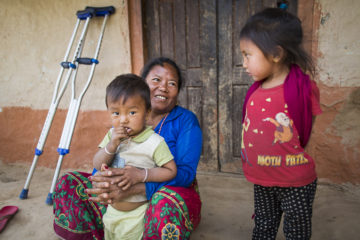
Bishnu and her grandchildren.
“My husband was very excited about how we can develop our village [through the project],” she said.
Bishnu injured her right leg while quickly fleeing her house during the earthquake.
“I jumped from here to here,” she said, pointing from the porch to the ground.
The 48-year-old didn’t have surgery until one year later, and recovery has been slow. “My life is not normal,” she said. “It’s hard for me to work. I try to do the kitchen work and cooking.”
Bishnu’s husband is a farmer, and her sons do masonry work in the city to help support the family. She is hopeful that raising goats will provide her family with a steady income.
And that, one day, the pain will cease and life will move beyond normal to a future that’s bright.

